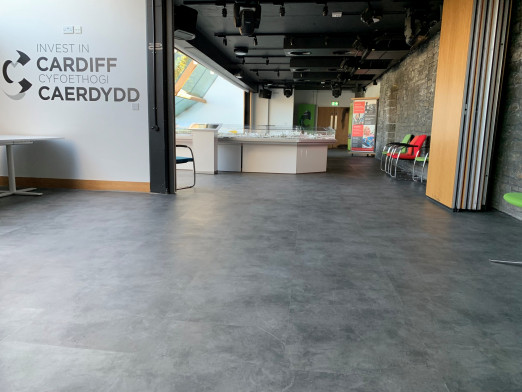The wider use of acoustic flooring is helping us lead quieter lives says Nick Egan, Technical Manager at Gerflor Limited.
Our world is not only getting faster it is getting noisier. Greater urbanisation and more people, vehicles, air traffic, electronic equipment and digital devices notifying us of voice texts, emails or app messages that need immediate attention, are just a few of the reasons why silence can be a rarity.
As manufacturers of vinyl flooring solutions for markets including housing, healthcare, sport, education and hospitality, we are aware that acoustic flooring is no longer usually confined to where there are specific noise issues, for example in flats where noise can easily travel from rooms above to those below. Instead, it is increasingly becoming a crucial part of the general specification process to reduce noise levels and increase comfort within new build and refurbishment projects across many sectors.
The need to increase sound insulation levels may, in part, be attributed to increasing evidence that elevated noise levels have negative effects on health and wellbeing. Exposure to regular and raised sound levels have been known to impair hearing and performance, induce stress and psychological conditions and contribute to heart problems and diabetic illness. It’s even said that children’s language and cognitive development can be impeded if noise interferes with speech and learning.
We can usually do more to improve disturbance noise in our homes by limiting the use and volume of TV, computer and electronic gadgets, installing sound reducing barriers to walls, ceilings and floors and installing flooring with good acoustic levels. But in other buildings we are reliant on those who design and manage the spaces and determine the choice of floor covering.
Sound experts tell us that improved acoustics help us to work better and more productively. In hospitals, if acoustics are overlooked the healing process is said to be hampered. In educational establishments, noise levels are considered to be detrimental to learning, academic performance and behavior.
So how sound works in many spaces is now being considered as highly as aesthetics by interior designers, architects and other building specifiers. The choice of flooring is consequently a major element of the acoustic targets for some building projects and is being considered alongside the use of other materials that can contribute to significantly lower airborne and impact sound transmissions and reduced noise pollution.
Vinyl floorings with excellent performance characteristics and sound reducing qualities that match the requirements of new and refurbishment projects are therefore providing solutions.
By combining durable, hardworking, hygienic and easy, low cost maintenance surfaces with aesthetics and acoustic levels of between 15dB and 20dB, according to the needs of each project, they can play a crucial role in helping to minimise nuisance noise, especially in busy surroundings like hospitals, schools and offices.
However, to achieve the best possible acoustic flooring solution, it is important that the flooring meets required regulations, is appropriate to where is it to be used within each and every individual project and is specified as early as possible in the overall scheme.
Sound insulation levels are measured using a decibel (dB) scale, which involves logarithmic units to measure airborne and impact sound. The UK’s Building Regulations 2003 Part E: Resistance to the Passage of Sound sets minimum standards for impact sound insulation and acoustic floorings can help achieve and even exceed requirements.
Impact sound is typically created when footsteps or heavy objects impact on a surface and transmit sound. Impact sound travels though the floor construction, including both solid structures and cavities, which is why occupants below often complain of nuisance noise generated on upper floors.
Decorative, vinyl floorings with fibre or foam backing systems built into their specification can offer improved levels of sound-insulation. For residential and housing developments decorative, cushioned, acoustic vinyl safety floorings that so successfully imitate wood, stone and natural materials with modern twists in design and colour, can provide a quiet, easy maintenance substitute and excellent all-round solution where both sound reduction and good looks are essential.
Luxury vinyl tiles and planks continue to grow in popularity due to their wide range of design and material effects and the variety of installation methods available. Selecting one with a resilient comfort core and a grip weave back layer will help to deliver acoustic benefits as the core will absorb sound as well as giving added comfort, whilst the backing, if it includes an air circulation design, will also help with acoustic properties. For example, decorative vinyl tiles with a resilient comfort cores and grip weave back layers provide easy-maintenance, durable, surface finishes that are suitable for use in areas like offices and shops where they must be hard working but also look good and be simple to clean.
Importantly, high quality heterogeneous resilient, vinyl floorings with excellent acoustic values coupled with slip resistance and high abrasion, indentation and stain resistance are developed for schools, hospitals and other heavy traffic environments with extreme noise levels. The addition of hygienic, easy-to-clean surface treatments that eliminate wax and polish can assist best practice cleaning and reduce maintenance and whole life-cycle costs.
Also, as a vinyl flooring manufacturer supplying worldwide markets, we are acutely aware that aesthetics are of uppermost importance when flooring is being chosen, whether for a home or a public building, which is why design must remain a vital component of acoustic floorings. Without doubt, acoustic flooring products are no longer just a specialist requirement but an increasing part of mainstream specification and important component of the overall acoustic solution.
Learn more about Gerflor’s acoustic range visit www.gerflor.co.uk./ 01926 622600 / email: contractuk@gerflor.com



